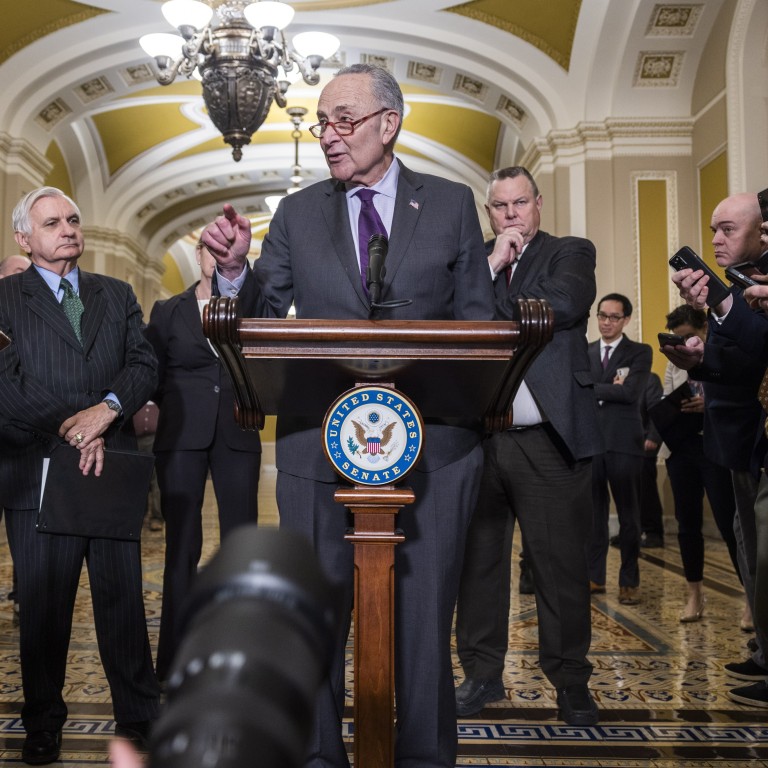
US Senate leader seeks support to bar business with China semiconductor manufacturers
- ‘We need our government and our economy to rely on chips made right here in America’, says Chuck Schumer, Democrat of New York
- Amendment would limit federal procurement of products or services using chips produced by Chinese giants like SMIC and YMTC
“We need our government and our economy to rely on chips made right here in America,” said Senate Majority Leader Chuck Schumer, Democrat of New York, on Monday.
“If American business wants the federal government to buy their products or services, they shouldn’t be using the kind of Chinese-made chips that, because of Chinese government involvement, put our national security at risk”.
Added to the “unverified list” by the Commerce Department on October 7, YMTC had highlighted its compliance “across the globe” to avoid being put on the department’s entity list, which would subject it to stricter export controls.
In July 2021, YMTC issued a statement in both English and Chinese claiming all its products and services were “exclusively for commercial and civil usage only”. It came in response to media reports about YMTC’s potential links to the Chinese military.
Mark Montgomery of the Foundation for the Defence of Democracies, a Washington think tank, said the focus on “putting the United States back on the offensive in the semiconductor field” should be “paired with ensuring that federal government networks are free of Chinese-made chips that pose a national-security risk”.
“In reality, US weapons are generally manufactured with these larger chips, not the smaller, cutting-edge chips,” Montgomery said.
US, allies gallop ahead in advanced chips, leaving China foundries stuck behind
But the proposal has evoked opposition from defence, tech and business groups.
A November 22 letter addressed to two top lawmakers from the Senate Armed Services Committee – Jack Reed, Democrat of Rhode Island, and Jim Inhofe, Republican of Oklahoma – asserted it would bring “tremendous compliance burdens”.
Signed by the Aerospace Industries Association, Alliance for Automotive Innovation, National Defence Industrial Association, CTIA, and the US Chamber of Commerce, the letter stated the proposal could “require entities that do business with the US government to trace their entire supply chain … regarding every item of equipment”.
Daniel Gerstein, senior policy researcher at American think tank Rand Corporation and author of the book Tech Wars: Transforming US Technology Development, pointed to an absence of “good visibility overall” in the supply chains linked to less advanced chips.
Former TSMC, SMIC executive Chiang Shang-yi joins Foxconn as top chip adviser
“On the high-end chips, we would have better visibility, but I don’t think it’s quite as transparent,” he said, adding that there was “not a good number” to show how prevalent Chinese chips are in US defence procurements.
The Biden administration has already banned Chinese companies from buying advanced chips and chip-making equipment or from hiring American citizens or green card holders for chip development.
Section 889 of the 2019 National Defence Authorisation Act already barred federal agencies from doing business with Chinese telecommunications companies or contractors who use their technology.
But China-related initiatives do not end with technology. Last week, Senator Kevin Cramer, Republican of North Dakota, along with Republican Senators Marco Rubio and Rick Scott of Florida and Tommy Tuberville of Alabama, introduced legislation to block members of China’s Communist Party from gaining US visitor visas.
Top US House Republican McCarthy vows a hard line on China
“You don’t need to have CIA-level clearance to know China is a bad actor,” said Cramer in a statement on his website.
One in every 15 people in China is a Communist Party member. The party boasts some 90 million members in a country whose total population stands at 1.4 billion.
Data from GovTrack, which follows the status of US federal legislation, showed there were 342 China-related bills in the last congressional term.
“I would say it suggests that we need to take a deep breath and to find common ground,” said Gerstein of the Rand Corporation. “I think it’s not in either interest to do something that precipitously would hurt either economy, or both economies.”

